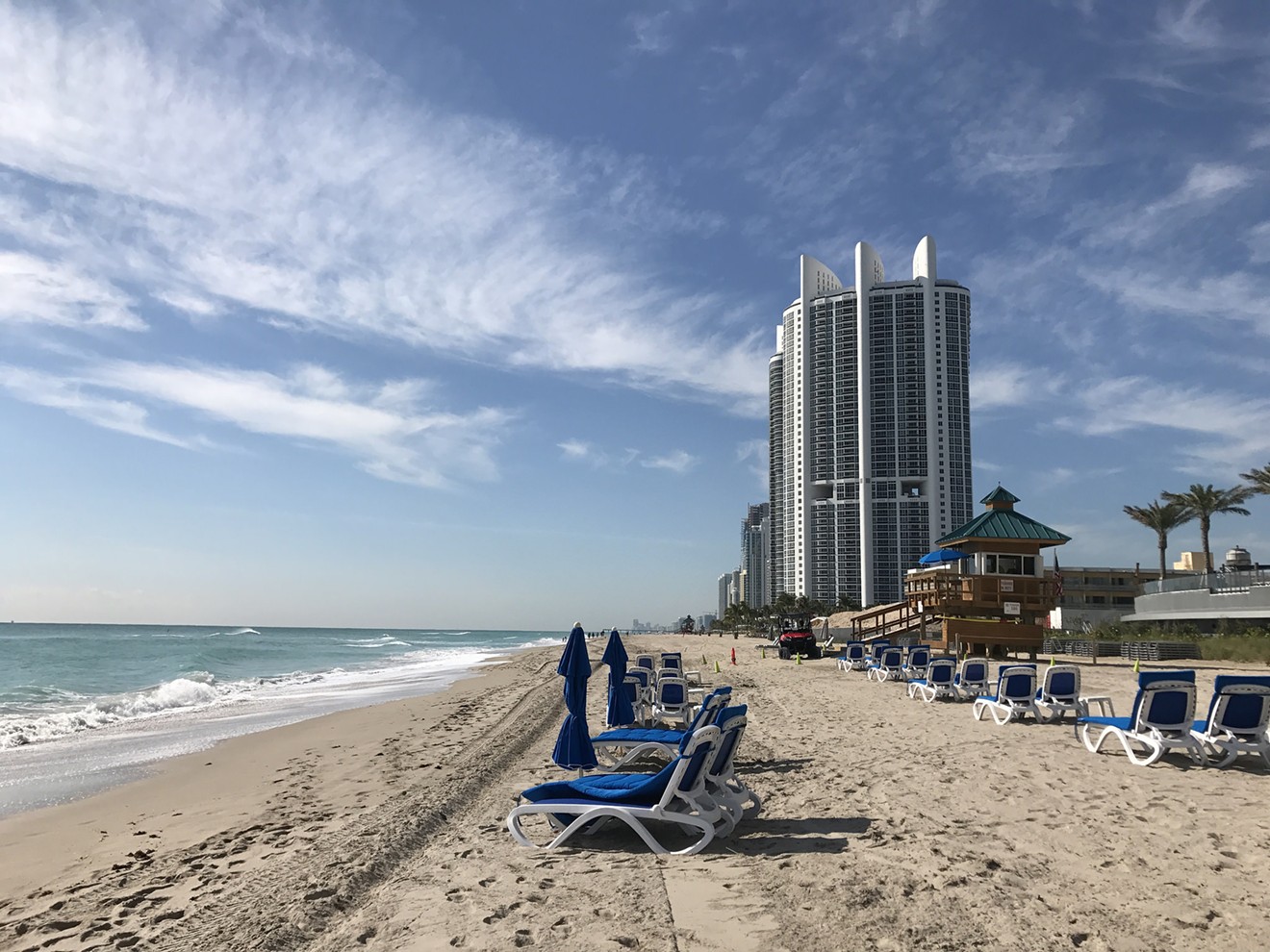A Miami real-estate analysis released Monday sheds light on the wonderfully stupid way South Florida operates: For the past handful of years, condo prices in the area have been criminally high, so condo developers have laid waste to any undeveloped piece of land they could find, stacking buildings into the sky regardless of whether anyone would buy them.
Now they've finally built so many they can't possibly sell all the multimillion-dollar condos. That's the conclusion of a study released this week by local real-estate analyst Peter Zalewski, who warns that Sunny Isles Beach, the ultrawealthy coastal community north of Miami Beach where the Trump International Beach Resort stands, now has nearly 1,350 condo units for sale. That's normally the number of condos the market would sell in two full years — but condo buildings are still being built, and the oversupply is almost certain to tank real-estate prices.
The current average asking price for a condo in Sunny Isles is $1.5 million. The average time needed to sell a unit in the area is 217 days — almost two-thirds of a year.
"It is worth noting this report only tracks those Sunny Isles Beach condos formally listed for sale," Zalewski's Condo Vultures realty firm wrote. "The report does not factor in the nearly 47,550 new condo units currently in the development pipeline east of Interstate 95 in the tri-county South Florida region."
By 2020, Miami-Dade will have a truly remarkable glut of properties to sell, and Zalewski's report suggests we really didn't need many of them in the first place. That's a shame, because land is scarce in South Florida and we need more public parks, community centers, mental-health-care facilities, and affordable-housing units. Developers instead have been allowed to cram nearly every lot with nearly identical condo towers priced to entice European mining magnates. This predicament represents a distinct failure of public planning and local governance. It's expensive for developers to buy land, so naturally they'll try to recoup as much money as possible.
Even other real-estate developers have begun to admit that fact: In June, Miami real-estate kingpin Jorge Pérez told the Real Deal South Florida that he thinks many local and international developers are "cowboys" with little understanding of the area's real-estate market.
"I’m not going to throw anyone under the bus, but you’re seeing some projects [where] I’m saying, 'Even in a good market, these should not be developed. It does not make sense," Pérez told the Real Deal.
(The FBI is reportedly investigating Pérez's Related Group for allegedly stealing money from affordable-housing trusts meant to help the poor afford rent, so take his "cowboys" dig with a grain of salt.)
Perhaps the highest-profile Sunny Isles building without "Trump" splashed on the side is the Porsche Design Tower, whose May grand opening included a performance by Alicia Keys. (The building has elevators that carry condo owners' cars up to their luxury homes in the sky.) The project has since been tangentially connected to a money-laundering probe in Brazil.
Miami's largely Republican teams of legislators tend to shrug and say they can't force developers to build affordable housing, while ignoring the fact that the political landscape is greased to encourage developers to build condo towers like lunatics when the market is good, chewing up vital land in the process. Zalewski's study is yet another sign that the status quo isn't working. The only semblance of a "plan" to help the area's deeply poor working class afford rent is to build so many luxury condos that the market crashes and we can all buy beachfront property for the price of a Mongoose bicycle.
According to Zalewski, there are 77 Sunny Isles Beach-area units under contract, with an average price of roughly $864,500 each.
"A balanced market is generally considered to have about six months of supply," Zalewski wrote. "More months of condo supply listed for sale suggests a buyer’s advantage and less months typically indicates a seller’s advantage in the market."
This is far from the first study to warn that Miami's real-estate market is dangerously overbuilt: In March, local real-estate analyst Andrew Stearns officially labeled the city's condo market "distressed."
[
{
"name": "Air - MediumRectangle - Inline Content - Mobile Display Size",
"component": "19274298",
"insertPoint": "2",
"requiredCountToDisplay": "2"
},{
"name": "Editor Picks",
"component": "17482312",
"insertPoint": "4",
"requiredCountToDisplay": "1"
},{
"name": "Inline Links",
"component": "18711090",
"insertPoint": "8th",
"startingPoint": 8,
"requiredCountToDisplay": "7",
"maxInsertions": 25
},{
"name": "Air - MediumRectangle - Combo - Inline Content",
"component": "17482310",
"insertPoint": "8th",
"startingPoint": 8,
"requiredCountToDisplay": "7",
"maxInsertions": 25
},{
"name": "Inline Links",
"component": "18711090",
"insertPoint": "8th",
"startingPoint": 12,
"requiredCountToDisplay": "11",
"maxInsertions": 25
},{
"name": "Air - Leaderboard Tower - Combo - Inline Content",
"component": "17482313",
"insertPoint": "8th",
"startingPoint": 12,
"requiredCountToDisplay": "11",
"maxInsertions": 25
}
]












